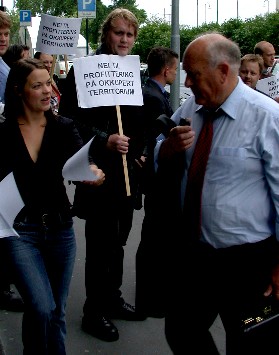|
afrol News, 11 June - Shareholders in the Norwegian seismic exploration company TGS-NOPEC were met by demonstrators today as they assembled to their annual general assembly. The company had signed an agreement with the Moroccan state and the oil companies Kerr McGee and TotalFinaElf to conduct a seismic survey in search for oil off the coast of occupied Western Sahara. The Norwegian Support Committee for Western Sahara today organised a demonstration, welcoming the shareholders at their Oslo meeting (see photo). Committee leader Ronny Hansen told afrol News he had been assured by one of the main shareholders that the controversial Western Sahara agreement also would be discussed at the assembly. The Committee also handed over an open letter to the shareholders and management of TGS-NOPEC, drawing their "attention to the very serious political and ethical implications of the agreement," which "clearly facilitates and legitimises the occupation of Western Sahara." The UN's Legal Office had earlier pronounced that any actual exploitation of Western Sahara's oil resources by Morocco would be illegal as Morocco is not the administrative Power of the territory. TGS-NOPEC's activities - while not necessarily being illegal on their own means - are a necessary prerequisite for an illegal exploitation, the Committee's letter holds. One of the principal shareholders in TGS-NOPEC is the Norwegian public National Insurance Scheme Fund, owning 4.6 percent of the company's shares. The Fund had been disturbed by the news of the agreement, which has been widely criticised as "politically naive" by the national financial press. The state-owned Fund, after contacting TGS-NOPEC, defended that the agreement in itself was not illegal, but still promised it would raise the matter in the company's general assembly. After the general assembly, TGS-NOPEC's CEO Hank Hamilton and CFO Arne Helland were invited to meet Norwegian MP and member of the Parliament's Foreign Committee, Lars Rise, who advised the company that it should consult with the Polisario Front, being the rightful representatives of the territory. Rise reminded the company leaders their contract "ruptures with 40 years of Norwegian decolonisation policies" and that it was not "wise in a long-term perspective." He had also said this to PM and party fellow Bondevik and Minister of Foreign Affairs, Jan Petersen.
Hamilton and Helland however keep insisting that what TGS-NOPEC is doing "is not illegal" and that what will happen after they had produced their seismic study "is not our responsibility." The Norwegian Support Committee for Western Sahara however argued that the data produced by TGS-NOPEC could only lead to illegal actions. "This is a political and ethical problem," Hansen told afrol News. "It is an ethic capitulation to claim that 'if we wouldn't do it, someone else would.'" Hansen further maintained that, even if TGS-NOPEC did "not want to be involved in a political issue," this was exactly what they were. "You cannot choose that in the case that it is already perceived as politics." Even the company's naming of the territory in its press releases had been pure politics, Hansen holds. While even the UN refers to Western Sahara as the territory's official name, TGC-NOPEC's first statement on the deal referred to "Southern Morocco". When contacted by a TV reporter, TGC-NOPEC executive Stein Ove Isaksen corrected the name to "the Southern Provinces" (official Moroccan terminology) but refused to clarify which country he meant, or to participate in a live interview. In its last statement, TGC-NOPEC only refers to "north-west Africa". Being one of the world's biggest seismic survey companies, TGC-NOPEC is one favourite investment target on the Oslo Stock Exchange. Norwegian economic analysts however hold TGC-NOPEC "has no idea at all of how to handle political matters". The company was taken totally by surprise by the political storm following its deal with Morocco. Sources in the Norwegian financial press told afrol News TGC-NOPEC was "in panic" after the unwanted attention. If one major shareholder decides to sell off its shares in the company, this could lead to more sales and a significant loss of value for the company. Political pressure against the National Insurance Scheme Fund is high to get rid of its TGC-NOPEC shares.
By Rainer Chr. Hennig, afrol News editor
|
front page
| news
| countries
| archive
| currencies
| news alerts login
| about afrol News
| contact
| advertise
| español
© afrol News. Reproducing or buying afrol News' articles.
You can contact us at mail@afrol.com

